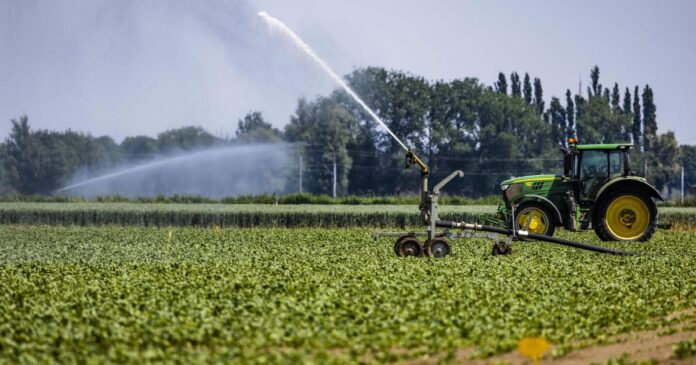Press play to listen to this article
Voiced by artificial intelligence.
Eoin Drea is senior research officer at the Wilfried Martens Centre for European Studies.
Wasn’t the war in Ukraine — and the soaring supermarket bills that followed — supposed to make food security a top priority for the European Union?
On a jaunt to the Global Food Security Summit in 2022, even European Council President Charles Michel noted that the need for stable food supplies was “the major global challenge today . . . and now is the time for all of us to translate our political commitments into concrete action.”
Alas, at the EU level, “concrete action” has turned into a euphemism for undermining the very agricultural sector that feeds its citizens. And thanks to the bloc’s determination to position Europe as the global hero of climate action, Brussels is well on its way to alienating and impoverishing a large part of rural Europe.
Setting increasingly ambitious environmental targets from the comfort of haute cuisine Brussels is one thing. But navigating the fraught local realities — which achieving such goals actually entails — is a totally different bag of frites.
Just look at the Netherlands.
After decades of Common Agricultural Policy (CAP) funding that prioritized greater output, Dutch farmers are now being told they are the ultimate villains of the emissions reduction debate. So, despite being lauded in the press as the “tiny country that feeds the world” and “world leaders in agricultural innovation, pioneering new paths to fight hunger,” tens of thousands of Dutch livestock farms are now facing closure or mandatory state appropriation.
This is all unfolding against the backdrop of a “greening” CAP, which has already seen European farmers reduce greenhouse gas emissions by 25 percent between 1990 and 2010. Even the European Commission acknowledges that “CAP provides an extensive level of ‘baseline protection’ for the environment on more than 80 percent of the EU’s agricultural land.”
Furthermore, farmers’ misgivings aren’t about denying climate change — which impacts them greatly — or misunderstanding the actions required to mitigate its worst effects. They’re about the lack of realism in Brussels when it comes to setting time frames to achieve the EU’s environmental targets — because it is those time frames that will collapse rural economies.
As it currently stands, farmers are literally being squeezed to death between the bloc’s emissions and biodiversity goals. And this is gutting rural Europe — and its 10 million family farms — from the inside out.
Remarkably, though, Agriculture Commissioner Janusz Wojciechowski in the Berlaymont doesn’t seem to really care, despite widening a rural-urban divide that will ultimately benefit populists on both sides of the political spectrum.
From a farming perspective, rural Europe is being disproportionately targeted by policymakers as easy prey. So, while car manufacturers (in Germany), the nuclear industry (in France) and big pharmaceutical companies (in Ireland and other member countries) have their state sponsors to water down — or delay — proposed European legislation, farmers are being hung out to dry on the altar of the EU’s climate ambitions.
And agriculture isn’t even the largest emitter of greenhouse gases in the EU. In fact, total agricultural emissions are equivalent to less than two-thirds of those derived from manufacturing or energy generation.
In this context, the EU’s climate approach — and its role in mainstreaming fringe economics — is already fanning rural social unrest. For example, the right-wing FarmerCitizenMovement (BoerBurgerBeweging, BBB) is now the largest party in the Dutch Senate and all provincial assemblies, despite only being established in 2019.
And therein lies a warning for the bloc’s complacency when it comes to rural Europe: The Dutch experience shows that disputes regarding centralized environmental planning can also tap into wider feelings of rural disconnection. How else could the Netherlands — with just 50,000 farmers — deliver nearly 1.5 million votes for the BBB in early 2023?
Extending well beyond the simplistic notion of rural areas being tied directly to the land, these movements are really about representing those living outside big cities who feel excluded from policymaking in national capitals. And they are giving a voice to small-town residents who feel threatened by governments’ increasingly rigid approach to social and environmental objectives.
So, as the growing opposition toward the proposed Nature Restoration Law continues to grab headlines, it’s only a cypher for a rural Europe that feels more and more alienated from urban policymaking elites.
The reality is that “fly-over” Europe is beginning to find its voice.

The political implications here are obvious — as in the Netherlands, rural voters will come to desert traditional centrist pro-EU parties and flock to wider protest movements that harbor much more uncertain attitudes toward Brussels instead. It will be a shift to a more vocal type of Euroskepticism that, if left unchecked, will ultimately weaken overall support for the EU’s climate and biodiversity agendas.
And that would be the ultimate disaster for both urban and rural Europe.
Back in 2018, Commission Vice President Frans Timmermans chaired a report on subsidiarity, which advocated for a new way of working that would “allow local and regional authorities and national Parliaments to make a more effective contribution to EU policymaking and in the design of new legislation.”
The EU now needs to recall its own counsel because Brussels is well on the way to losing rural Europe — and it only has itself to blame.


